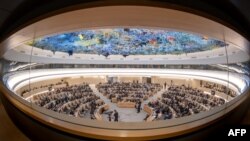United Nations experts who attended an emergency session on Sudan at the U.N. Human Rights Council Thursday were thwarted in their appeal for independent investigations into atrocities allegedly committed against Sudanese civilians by two rival armed forces.
By a vote of 18 in favor, 14 against, and 15 abstentions, the 47-member Council adopted a resolution that condemns the human rights violations committed after the October 25, 2021, military coup in Sudan and the conflict that erupted this year on April 15.
The resolution says these actions have "led to the death of hundreds of civilians, thousands injured, increased levels of sexual and gender-based violence, mass internal and external displacement, and destruction of property."
The resolution calls for the U.N. designated expert on human rights in Sudan to monitor and document all allegations of human rights and abuses since the 2021 military takeover.
However, Hassan Shire, executive director of the rights organization DefendDefenders said the resolution "remains below what is objectively needed, namely an investigative mechanism that exposes and holds accountable those responsible for inflicting this misery on the Sudanese people."
Hope for democracy crushed
In his opening speech to the Council, Volker Türk, the U.N. high commissioner for human rights, condemned the 2021 military coup, which was carried out by the commander of Sudan's army, General Abdel Fattah al-Burhan, and the paramilitary Rapid Support Forces leader, General Mohamed Hamdan Dagalo.
Türk said the recent fighting, which was triggered by animosity between the two men, has plunged the country into catastrophe and once again has crushed the hoped-for transition to full civilian rule and democracy.
"I strongly condemn this wanton violence, in which both sides have trampled international humanitarian law, notably the principles of distinction, proportionality and precaution," Türk said.
He noted the clashes between the two rival forces and armed attacks, including shelling and airstrikes in densely populated residential areas in the capital Khartoum, have put millions of civilians at acute risk and have prevented them from accessing critical supplies and assistance.
"Today, immense damage has been done, destroying the hopes and rights of millions of people," he said. "It is essential that both parties urgently commit to an inclusive political process and to a negotiated peace."
Türk called on Sudan's rival commanders to establish a humanitarian truce "to enable lifesaving deliveries of aid; to allow for safe passage for civilians from areas of hostilities; and to protect humanitarian supplies from looting."
He enjoined them to respect international humanitarian law, to protect civilians, and bring an end to human rights violations.
'An internal affair'
Several humanitarian cease-fires declared since the start of fighting last month have failed to stop the violence.
The chair of the Coordination Committee of Special Procedures, Tlaleng Mofokeng, echoed the High Commissioner's plea for the warring parties to immediately end the fighting and to stop targeting the civilian population and infrastructure.
She called for immediate, independent and impartial investigations into the loss of civilian lives and "gross human rights violations inflicted upon humanitarians, human rights defenders and other civic activists."
"Establishing robust investigative and accountability mechanisms is of utmost importance, as they are instrumental in effectively monitoring, documenting, investigating, and prosecuting violations," she said.
In a testy interchange with council members, Hassan Hamid Hassan, Sudan's ambassador to the U.N. in Geneva, said what is happening in his country is "an internal affair" and what the Sudanese Armed Forces are doing is "a constitutional duty for all armies of the world."
He questioned why the council was rushing to hold this ad hoc session now, "especially without the support of any African or Arab countries."
Hassan said that the protection and promotion of human rights has always been and always will remain a priority for his government.




